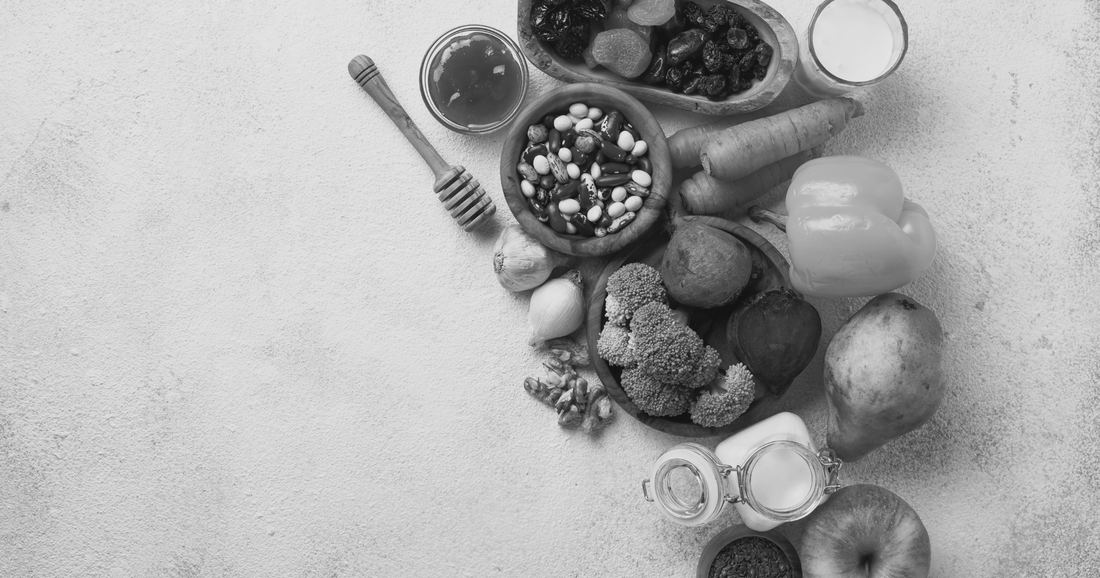
Gut Health for Mood Boost: Foods That Feed Your Brain
Share
You’ve probably heard the phrase, “you are what you eat.” But did you know that what you eat can also affect how you feel?
Your gut and your brain are more connected than you might think. In fact, the health of your gut plays a big role in your mood, energy, and mental clarity. This is because your gut and brain communicate through something called the gut-brain axis. It’s a two-way connection that links your digestive system with your central nervous system.
When your gut is healthy, your brain feels the benefits. But when it’s out of balance, it can lead to brain fog, anxiety, depression, and low energy. In this post, we’ll explore how gut health affects your mood, and which foods can help boost both.
How Gut Health and Mood Are Connected
Inside your digestive system lives a community of bacteria, fungi, and other microbes. This is called the gut microbiome. It helps break down food, absorb nutrients, and keep harmful bacteria in check.
Your gut also produces important brain chemicals like serotonin, which helps regulate mood, sleep, and appetite. In fact, about 90% of your serotonin is made in your gut.
When your gut microbiome is balanced, it supports good mental health. But if it becomes imbalanced (due to poor diet, stress, antibiotics, or illness), it can affect your brain. This may lead to mood swings, fatigue, and feelings of anxiety or depression.
Signs Your Gut Might Be Affecting Your Mood
Here are some common signs that your gut health may need support:
- Frequent bloating or gas
- Constipation or diarrhea
- Low energy or brain fog
- Trouble sleeping
- Anxiety or irritability
- Sugar cravings
- Skin issues (like acne or rashes)
If you notice any of these, making changes to your diet can help improve both gut health and mood.
Best Foods to Feed Your Brain and Support Gut Health
The good news? You can support your gut, and your mental well-being by eating the right foods. Let’s look at the top gut-friendly foods that also help improve mood.
1. Yogurt
Yogurt is rich in probiotics, the “good” bacteria that help balance your gut microbiome.
Look for plain yogurt with live and active cultures. Avoid flavored yogurts with added sugars, which can feed bad bacteria and cause inflammation.
Bonus: Probiotics in yogurt may help reduce stress and anxiety.
2. Kefir
Kefir is a fermented milk drink packed with more probiotics than most yogurts. It also contains vitamins, minerals, and proteins that support brain health.
Drink a small glass in the morning or add it to smoothies for a gut-boosting start to your day.
3. Sauerkraut and Kimchi
Both are fermented vegetables full of probiotics and fiber. They help feed the good bacteria in your gut while supporting digestion.
Add a spoonful to salads, wraps, or rice bowls for flavor and mental health benefits.
4. Bananas
Bananas are rich in prebiotics, which act like food for probiotics. They also contain vitamin B6, which helps produce serotonin.
A ripe banana makes a great snack or smoothie ingredient, and supports both your gut and brain.
5. Oats
Oats are high in fiber, especially beta-glucan, which supports gut bacteria and balances blood sugar.
They also help you feel full and energized, reducing mood swings from sugar crashes.
Start your day with oatmeal, overnight oats, or oat smoothies.
6. Berries
Blueberries, strawberries, and raspberries are full of antioxidants that protect your brain and reduce inflammation.
They also support gut health by encouraging the growth of beneficial bacteria.
Eat them as a snack, add to yogurt, or blend into smoothies.
7. Leafy Greens
Spinach, kale, and Swiss chard are rich in fiber, vitamins, and antioxidants that support gut and brain health.
They contain folate, which is linked to lower risk of depression and better cognitive function.
Toss greens into salads, soups, or sautéed dishes daily.
8. Fatty Fish
Salmon, mackerel, and sardines are high in omega-3 fatty acids, which help reduce inflammation and support brain function.
They also support a healthy gut barrier, which keeps toxins out of your bloodstream.
Aim for 2–3 servings per week for maximum benefits.
9. Nuts and Seeds
Almonds, walnuts, chia seeds, and flaxseeds are full of fiber, healthy fats, and minerals like magnesium.
Magnesium helps regulate mood and reduce anxiety. The fiber feeds your gut bacteria.
Sprinkle them on salads, oats, or smoothies.
10. Dark Chocolate
Yes, chocolate can be good for your mood and gut, if it’s the right kind.
Dark chocolate (70% or higher) is rich in polyphenols, antioxidants that feed good gut bacteria and boost serotonin.
Enjoy a small piece as a treat or melt it into oats or smoothies.
11. Beans and Lentils
Legumes are a powerful combo of fiber, protein, and B vitamins. They support stable blood sugar and feed your gut bacteria.
They’re also rich in tryptophan, a building block of serotonin.
Add them to soups, stews, or bowls for a filling, mood-boosting meal.
12. Green Tea
Green tea contains L-theanine, an amino acid that promotes calm and focus.
It also has antioxidants that support both brain and gut health.
Sip a warm cup in the morning or afternoon instead of coffee.
When you focus on nourishing your gut to lift your mood, consider how your clothing supports that positive shift. Built By Battle’s wellness clothing for nutrition-focused living is crafted for comfort and clarity. Our motivational apparel for mindful lifestyle helps you stay grounded, confident, and aligned with your internal reset.
Foods That Can Harm Your Gut and Mood
Some foods may harm your gut microbiome and lead to mood imbalances. Try to limit or avoid the following:
- Sugary drinks and snacks: Feed harmful bacteria and lead to energy crashes.
- Highly processed foods: Contain chemicals and additives that can cause inflammation.
- Artificial sweeteners: May negatively affect gut bacteria and digestion.
- Alcohol: Can damage gut lining and disrupt sleep and mood.
- Fried foods: Increase inflammation and slow digestion.
You don’t have to cut these out completely. But reducing them can help your gut and mood improve over time.
Tips for a Happier Gut and Brain
Small changes to your daily habits can make a big difference in how you feel. Here are some easy ways to support both your gut and mood:
1. Eat a Variety of Whole Foods
Different plant-based foods support different gut bacteria. Aim for 30 different plants per week, including fruits, veggies, nuts, and seeds.
2. Drink Plenty of Water
Staying hydrated helps with digestion and supports a healthy gut lining.
3. Manage Stress
Chronic stress can harm your gut. Try deep breathing, meditation, or short walks to relax during the day.
4. Move Your Body
Exercise supports gut health and releases feel-good endorphins. Even a 20-minute walk can help.
5. Get Enough Sleep
Sleep helps your body repair and keeps your gut and brain in balance. Aim for 7–9 hours per night.
6. Eat Slowly and Mindfully
Chew your food well and take your time. This helps digestion and helps your brain know when you’re full.
Final Thoughts
Your gut and brain are a powerful team. When you feed your gut with the right foods, your brain benefits too. A balanced gut supports better moods, sharper focus, and more energy throughout the day.
Start small. Add a probiotic food like yogurt, include fiber-rich oats or veggies, and cut back on processed snacks. Over time, your gut will thank you, and your mood will improve too.
Remember, gut health isn’t just about digestion. It’s one of the keys to feeling good from the inside out.
